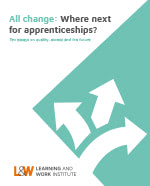We need an international benchmark of excellence – #ApprenticeshipFutures

It’s easy to groan at the latest apprenticeship statistics and think that it’s another executive failure, it’s less easy to look beyond this and offer ideas on how to turn it around.
True, the numbers are not in the Levy’s corner, with starts nearly 30% lower than last year, but it’s not the most useful way to judge its success. More important is how good are the apprenticeships being offered and are they reaching the people they should be.
We wholeheartedly support the introduction of the Levy and other reforms on the principle that apprenticeships are a great way for young people to learn, to earn while they learn and also to make the transition to the world of work.
Apprenticeships also support adults to return to the jobs market, develop in their role or upskill, or retrain.
We know that it takes time for programmes to bed in and so we are not expecting this to work overnight. But it could be said that the Government could apply some apprenticeship thinking to its own measure and like all good apprentices learn as it goes along.
There are plenty of ideas, people and organisations out there that want to make it work and who are showing that it can work. An outstanding example is pladis, the home of McVities, acknowledged this week with the Employer’s award in the Festival of Learning Awards, run by Learning and Work Institute and supported by the Department for Education.
McVities’ is using its Apprenticeship Levy to pioneer an innovative approach that brings the learning onto the factory floor, 24 hours a day, working in partnership with the College of North West London.
They have developed McVities’ ‘Advanced Team Members’ training programme into an apprenticeship that is open to employees who work on the biscuit production lines and who have responsibility for light maintenance and troubleshooting of the line. Employees study for qualifications in maintenance engineering and installation, along with functional English, maths and ICT and access higher-level engineering training that would be the norm for their jobs.
The benefits are multi-fold. Staff retention is high, there is in-work progression, and a productive workforce that helps pass on its knowledge to new and more junior staff. It also reduces pressure on the advanced engineers as the higher skilled Advanced Team Members (ATMs) can deal with many mechanical faults, saving on external repair costs and machine down-time. They also come up with ideas to recurrent issues.
At the awards ceremony I spoke to some of the McVities’ ATMs attending and they were visibly enthusiastic about their learning and the development they get at work. They highlighted that the programme was available to people working night shifts as well as day shifts which meant everyone had an equal chance because if the training had meant attending a college then many people wouldn’t be able to do it. They also liked that they could learn whilst doing their shifts and again felt this made it accessible to everyone.
Earlier this month Learning and Work Institute published All change: where next for apprenticeships? a collection of essays from a range of experts offering concrete ideas on how to make apprenticeships work better.
We think changes are needed but we don’t advocate dropping the idea of the Levy.
Instead the focus should be on building confidence, particularly amongst young people, that apprenticeships are a great option.
At our launch event for the collection at the House of Commons, hosted by Robert Halfon MP, chair of the Education Select Committee, a standout contribution was made by one of our essay authors Dexter Hutchings.
Dexter has just successfully completed an apprenticeship and been offered a full-time job. He explained that he had not got on at school but had found his niche in going out to work and becoming an apprentice.
His writing of the essay and his subsequent public eloquence was impressive, and it was hard to imagine that any school had not embraced him.
It further shows the importance of apprenticeships as an alternative to the ‘success’ model of A-levels and standard university degrees.
The amount of young people doing apprenticeships in the UK is low by international standards.
A key need is to offer apprenticeships that are of good quality.
We need to make a start on a benchmarked standard – set by the Government against the world’s best – that can be recognised by young people, their parents, schools, employers and people already working.
Another way to improve apprenticeships is to improve access to them: there are inequalities in accessing apprenticeships as in most forms of education. But they could be a route to improving social mobility and improving other inequalities around race, gender and disability. A measure to support this would be changing the funding system to include an ‘Apprentice Premium’, similar to the ‘Pupil Premium’ in schools.
Overall, we need to make sure that all the Levy money is spent on workforce development and not returned to the Treasury if it’s underspent.
If it looks like there could be an underspend, this could be redeployed including offering a greater role for local areas, which could take decisions on what their local skills needs are and how to best to meet them.
In our essay collection Dr Julie Nugent, Director of Skills and Productivity at West Midlands Combined Authority (WMCA) highlights the role of apprenticeships and learning in wider economic development. She says that the WMCA is seeking a new relationship with government, championing a more joined-up approach to better address regional needs. This would involve “an integrated employment support framework to align support for the unemployed and low skilled/low-paid, and help more residents access good jobs and apprenticeships”.
IPPR Senior Research Fellow Joe Dromey also calls for a wider role for local government, saying that the levy in its current form is not working “in part because of the reliance on an overall centralised system”.

He says that unspent levy funds “should be devolved to local areas, according to skills needs. This could then be invested to subsidise apprenticeships in priority areas or to provide other high-quality vocational provision” along with providing support to businesses and funding careers advice.
The experience of both Dexter and the employees at McVities shows that when done well apprenticeships make a valuable contribution to both giving young people a start on their working life and to skilling up people who are already in the workforce.
Therefore, we hope that the Government will complete its own apprenticeship successfully by listening to those who truly want to make the system work.
Sarah Horner, Head of Policy and Communications, Learning and Work Institute, Co-editor of All change: where next for apprenticeships?
Copyright © 2018 FE News











Responses